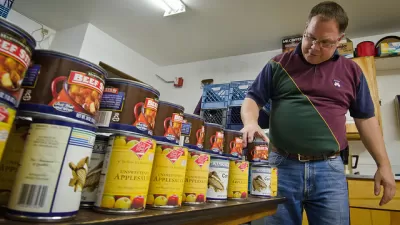In our work to build communities of opportunity where low-income people and people of color can thrive, we must acknowledge that income is how you get out of poverty, assets are how you stay out.

In Tuesday night’s State of the Union address, President Obama laid out a vision for rebuilding the middle class with pathways to the middle class for lower-income families. But to manifest this vision, we need a much stronger focus on addressing the root causes of concentrated, generational poverty: financial insecurity and lack of ownership.
In our work to build communities of opportunity where low-income people and people of color can thrive, we must acknowledge that income is how you get out of poverty, assets are how you stay out.
While income inequality in the U.S. recently hit its highest peak in 78 years, the wealth gap is even worse. The racial wealth gap—the difference in net worth between households of color and that of their white counterparts—has more than tripled since 1984. Today, African-American and Latino households have less than $1 in assets for every $6 that white households own. This is taking place in the context of a major demographic shift that will only magnify the costs of the racial wealth gap. By the end of the decade, the majority of youth will be people of color, and by 2044, the population majority overall will be people of color.
Assets and ownership are fundamental to economic opportunity and mobility. A child with a savings account in their own name is 2.5 times more likely to complete college than a child without one. That number jumps to 4.5 times more likely if that child is from a low-income household. Homeownership is linked to inheritance and access to credit, while access to credit is based on your income.
FULL STORY: Income is How You Get Out of Poverty, Assets are How You Stay Out

Planetizen Federal Action Tracker
A weekly monitor of how Trump’s orders and actions are impacting planners and planning in America.

Restaurant Patios Were a Pandemic Win — Why Were They so Hard to Keep?
Social distancing requirements and changes in travel patterns prompted cities to pilot new uses for street and sidewalk space. Then it got complicated.

Map: Where Senate Republicans Want to Sell Your Public Lands
For public land advocates, the Senate Republicans’ proposal to sell millions of acres of public land in the West is “the biggest fight of their careers.”

Maui's Vacation Rental Debate Turns Ugly
Verbal attacks, misinformation campaigns and fistfights plague a high-stakes debate to convert thousands of vacation rentals into long-term housing.

San Francisco Suspends Traffic Calming Amidst Record Deaths
Citing “a challenging fiscal landscape,” the city will cease the program on the heels of 42 traffic deaths, including 24 pedestrians.

California Homeless Arrests, Citations Spike After Ruling
An investigation reveals that anti-homeless actions increased up to 500% after Grants Pass v. Johnson — even in cities claiming no policy change.
Urban Design for Planners 1: Software Tools
This six-course series explores essential urban design concepts using open source software and equips planners with the tools they need to participate fully in the urban design process.
Planning for Universal Design
Learn the tools for implementing Universal Design in planning regulations.
Heyer Gruel & Associates PA
JM Goldson LLC
Custer County Colorado
City of Camden Redevelopment Agency
City of Astoria
Transportation Research & Education Center (TREC) at Portland State University
Camden Redevelopment Agency
City of Claremont
Municipality of Princeton (NJ)





























